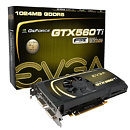- Joined
- Oct 9, 2007
- Messages
- 47,878 (7.38/day)
- Location
- Dublin, Ireland
| System Name | RBMK-1000 |
|---|---|
| Processor | AMD Ryzen 7 5700G |
| Motherboard | Gigabyte B550 AORUS Elite V2 |
| Cooling | DeepCool Gammax L240 V2 |
| Memory | 2x 16GB DDR4-3200 |
| Video Card(s) | Galax RTX 4070 Ti EX |
| Storage | Samsung 990 1TB |
| Display(s) | BenQ 1440p 60 Hz 27-inch |
| Case | Corsair Carbide 100R |
| Audio Device(s) | ASUS SupremeFX S1220A |
| Power Supply | Cooler Master MWE Gold 650W |
| Mouse | ASUS ROG Strix Impact |
| Keyboard | Gamdias Hermes E2 |
| Software | Windows 11 Pro |
EVGA kicked off its GeForce GTX 560 Ti offer with two models: a base model (01G-P3-1561-AR), and a SuperClocked model (01G-P3-1563-AR). Both cards stick to NVIDIA's reference board design (PCB and cooler). The base model comes with "Free Performance Boost", it's slightly overclocked out of the box, while being priced on par with graphics cards that stick to NVIDIA reference speeds. The base model is clocked at 850/1700/1026 (4104) MHz (core/CUDA cores/memory actual (effective)), vs. reference speeds of 820/1640/1000 MHz. It is priced at US $249.99.
The SuperClocked model, on the other hand, features significantly increased clock speeds (over reference) of 900 MHz core, 1800 MHz CUDA cores, and 1053 MHz (4212 MHz effective). This variant is priced at $269.99. Both cards claim to be superior over non-reference design implementations that use PCBs with lesser number of layers, and lesser number of GPU electrical phases.


View at TechPowerUp Main Site
The SuperClocked model, on the other hand, features significantly increased clock speeds (over reference) of 900 MHz core, 1800 MHz CUDA cores, and 1053 MHz (4212 MHz effective). This variant is priced at $269.99. Both cards claim to be superior over non-reference design implementations that use PCBs with lesser number of layers, and lesser number of GPU electrical phases.


View at TechPowerUp Main Site



